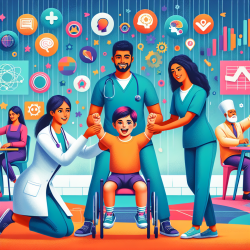Introduction
Recent research has highlighted the significance of genetic mutations in the TLK1 and MDM1 genes, which have been linked to neurodevelopmental disorders (NDDs) and immunodeficiency. As practitioners in the field of speech-language pathology, understanding these genetic underpinnings can enhance our approach to therapy, particularly for children presenting with complex developmental profiles. This blog explores the findings of a study that identified a patient with a de novo TLK1 variant and a mutation in MDM1, providing insights into how these genetic factors may influence developmental outcomes.
Key Findings from the Study
The study in question examined a male patient with intellectual disability, seizures, global developmental delay, and primary immunodeficiency. Genetic analysis revealed a heterozygous TLK1 variant (c.1435C>G, p.Q479E) and a mutation in MDM1 (c.1197dupT, p.K400?). The research provided the first functional characterization of NDD-associated TLK1 variants, demonstrating reduced kinase activity and suggesting potential impacts on multiple tissues during development.
Implications for Practitioners
Understanding the genetic basis of neurodevelopmental disorders can significantly impact therapeutic approaches. Here are some ways practitioners can leverage these findings:
- Personalized Therapy: Tailor interventions based on genetic profiles to address specific developmental challenges.
- Interdisciplinary Collaboration: Work closely with geneticists and other healthcare professionals to create comprehensive care plans.
- Focus on Communication: Given the speech and language delays associated with TLK1 mutations, emphasize communication strategies that leverage the child's strengths.
- Monitor Immunological Health: Be aware of potential immunodeficiency issues that may affect overall health and therapy participation.
Encouraging Further Research
While this study provides valuable insights, it also opens the door for further research. Practitioners are encouraged to stay informed about ongoing genetic research and consider participating in studies that explore the link between genetics and developmental disorders. Such involvement not only enhances professional knowledge but also contributes to the broader understanding of these complex conditions.
Conclusion
The study of TLK1 and MDM1 mutations underscores the importance of genetic factors in neurodevelopmental disorders and immunodeficiency. By integrating these insights into practice, speech-language pathologists can enhance therapeutic outcomes for children with complex developmental profiles. For those interested in delving deeper into the research, the original study provides a comprehensive analysis of these genetic mutations and their implications.
To read the original research paper, please follow this link: De novoTLK1 and MDM1 mutations in a patient with a neurodevelopmental disorder and immunodeficiency.










